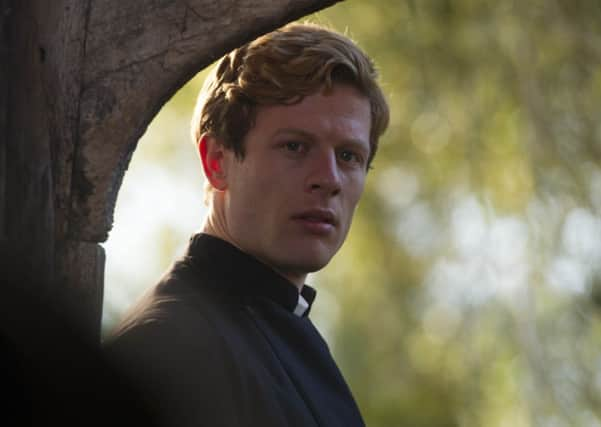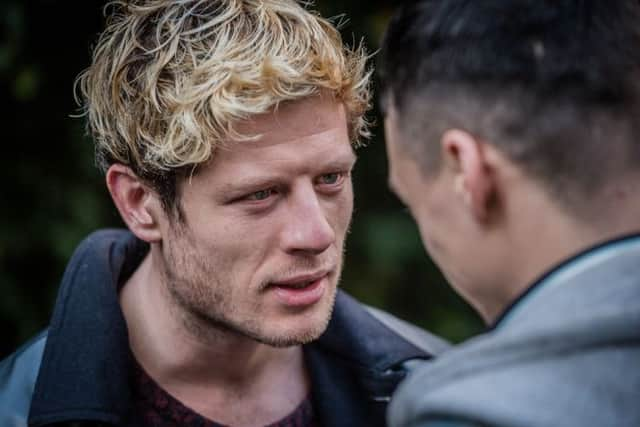How James Norton went from killer to clergyman


He may have scared everyone out of their wits when he appeared as the convicted killer and kidnapper Tommy Lee Royce in Happy Valley earlier this year, but now there’s a complete change of direction for James Norton.
He’s landed the lead in new television series Grantchester. Set in the real-life picturesque community just outside Cambridge, he plays clergyman detective Sidney Chambers, a role which is likely to earn him numerous plaudits.
Advertisement
Hide AdAdvertisement
Hide AdMalton-born and raised, Norton says his love of performing began at his old school, Ampleforth College.


“Back then,” he recalls. “It was an all-boys school, and for some reason best known to them, the masters and monks in the drama department always used to cast me in the female roles. There were plenty of opportunities for drama and the staff were wonderful, they really fired you up. It’s a beautiful place, in a magical, mystical setting.
“While I was there I even managed to get three weeks of work experience at the Stephen Joseph Theatre in Scarborough. I was only 15, and as an insight into what went on, it was completely invaluable. There were also one or two slightly bonkers people there, being rather eccentric, but that made it all the more enjoyable and fascinating. It could have put me off acting and the theatre for life, but I actually think it flicked the switch.”
After Ampleforth, Norton headed to Fitzwilliam College, Cambridge. He was supposed to be reading theology, but he spent most of his time with the various theatre societies.
Advertisement
Hide AdAdvertisement
Hide Ad“It was a case of a bit of learning, with a lot of acting thrown in. Looking back, I can’t think of a drama or acting group that I wasn’t a member of. We did some decent stuff, but also some absolute rubbish. I think that the worst experience I ever had was taking a show – luckily I’ve forgotten the title – to the Edinburgh Fringe one year, and, in the middle of what was supposed to be an energetic sex scene on an Ikea table, the thing broke and we both ended up on the floor. The audience thought it was hysterical.”
As well as the embarrassing moments, there were he recalls some amazing highs, not least Trevor Nunn turning up to direct a production of Cymbeline that commemorated the centenary of the Marlowe Society, in which Norton was cast as Posthumus.
“You could learn more about acting and directing in two minutes with that genius of a man than you ever could doing it for a year with someone else. It was a dream, really.”
That production was his inspiration to finally apply to RADA. He got in and graduated four years ago and his career has taken off like a rocket. He’s done an acclaimed theatre tour (playing Stanhope) in Journey’s End. He appeared in George Gently and in the film An Education, with Carey Mulligan. He went into the West End (again directed by Trevor Nunn, and at the Haymarket Theatre) to play Prince Geoffrey in The Lion in Winter. He was a racing driver in the movie Rush, and a lover in Belle. There was an episode of Doctor Who and more work in Death Comes to Pemberley. Job has succeeded job, apparently seamlessly.
Advertisement
Hide AdAdvertisement
Hide Ad“It was a busy few years, and a very happy time,” says James, “and I was extremely lucky. I don’t like being idle”. His breakthrough role came in Happy Valley, as the devilishly handsome, convicted drug dealer Royce. Written by Sally Wainwright, it clocked up huge viewing figures, and James says (with a naughty smile) “by the end of it, I had about eight million people in this country who hated me with a vengeance. The funny thing is that I’d auditioned for Grantchester before I was offered Happy Valley, and for a short period of time, I was actually filming them both. The schedule was ludicrous, not to mention switching from this evil man to the Rev. Chambers. I kept on thinking to myself ‘What if, one day on set, I get the two muddled, and I start being a psychotic killer in Grantchester, and a vicar in Happy Valley?’ Fortunately, I managed to keep it all together.”
Granchester is based on the novels by James Runcie, who is the writer and academic son of Robert Runcie, the former Archbishop of Canterbury. But Chambers is no Agatha Christie-style gentleman sleuth, even though the stories start off in the early Fifties, in a rather drab post-war world where rationing was still part of daily life.
James explains: “Being able to talk about doing theology at Cambridge was a very good opening gambit at the audition. Sidney’s fought in the war, and was an officer in the Scots Guards. He killed people – which, as a clergyman, was deeply against his faith and his principles. He was a brave man, but that comes with a price. We’ll find out more about that later. He is in love, and he likes his whisky – perhaps more than he should. He has his dark side, but he is also kind, and concerned, and a good man. In a way, he is still growing up.
“Sidney is essentially a nice person, and he sees the world, essentially, as a benign place – which is completely the opposite of Tommy, who saw it all as a hostile environment to be in. When Happy Valley was on, I was warned that I could really be attacked by angry viewers who might recognise me. Thank God it didn’t happen, but playing someone as nasty as Tommy does drain you, no matter how much you can walk away from him at the end of the day’s work. It’s not nice to be in that space for six months”.
Advertisement
Hide AdAdvertisement
Hide AdHe thinks that making Granchester in the real-life village (“which is a lovely little place”) added immeasurably to the feel of the series.
“We had a lot of extras for some scenes,” he says, “and they were augmented for sequences in the church there by a good many of the locals. They were all paid, I hasten to add. At first they all thought that this might be terribly exciting, being in a big series, but then, as the hours went on, and scenes were shot from different angles, and lighting rearranged, and time started to drag, they realised just how boring the day can be when the actors aren’t acting and the cameras aren’t turning. But we also set up a few cricket matches with their local team and that really broke the ice.”
Norton’s co-star in the series is Robson Green, who plays a local police inspector who at first resents what he thinks is the meddling of a priest with too much time on his hands. “But then the two men form a bond, and a friendship develops. They are like chalk and cheese at first, and Robson’s character Inspector Keating is at first deeply suspicious of this little whippersnapper.”
When we meet he is about to head to Wales to start work on his next project, a new screen version of Lady Chatterley’s Lover, in which he will play the war-wounded husband, Sir Clifford, who loses his wife’s affections to the estate gamekeeper. Holliday Grainger will play Lady Chatterley. “It’s been written by that genius Jed Mercurio, and it gives a whole new slant to the story,” he promises.
Advertisement
Hide AdAdvertisement
Hide AdThere’s already a feeling – fuelled by excellent reactions to preview screenings, that Granchester has the potential of returning time and time again. “Robson Green, who has been around long enough to know what he is talking about, told me the other day that if it truly is the success that everyone hopes for we might be doing Grantchester until we’re in our seventies – but I’m really not so sure about that, because I honestly do like a lot of variety, and to ring the changes. I definitely wouldn’t mind filming a few more stories – the thing is, we first have to get our author to write them.”
While Norton might be desperate for variety, the one constant in his life is his family and he regularly returns to Malton.
“I love the place, I get up there all the time. The funny thing is that, when I moved away for the first time when I was 18, I had a real Yorkshire accent.
“Of course it got rubbed off a bit at university, and then even more when I started going for auditions because directors and casting directors have a fixed idea of what they want from an actor. If you don’t immediately give them their vision, their perception, then you don’t get the role.
“They want the character that they have in their head to walk into the room. So the thing is to ‘neutralise’ how you speak a little. But when I go home, the accent returns within an hour or so.”